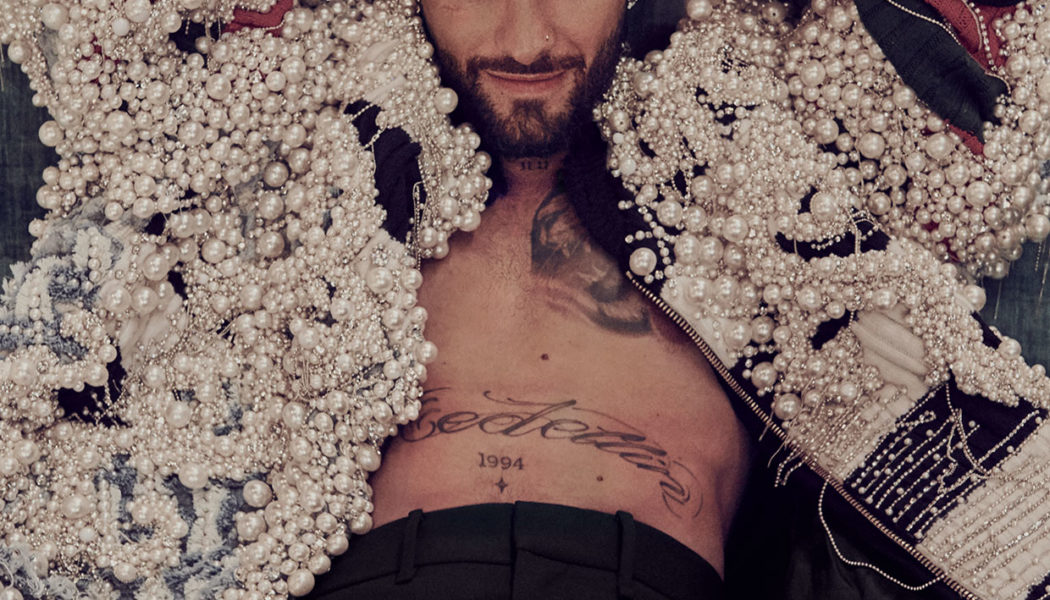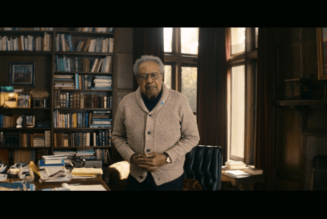Eighteen years before he sold out stadiums across the globe, Maluma was selling ham and cheese sandwiches.
“That’s where my entrepreneurial spirit comes from,” he says, a proud gaze peeking out from behind his black-rimmed, orange-tinted shades. As a 10-year-old in Medellín, Colombia, Maluma (born Juan Luis Londoño Arias) would neatly pack his homemade sandwiches and tote them to Hontanares Elementary School, where he would sell them alongside lollipops. Then he would put the money he made back into his sandwich startup.
“I bought more bread, more ham, more cheese and started to grow in the sandwich industry,” Maluma says, letting out an infectious chuckle. “I’d come to school with my sandwiches and people would ask me, ‘How much do they cost?’ And I’d say, ‘How much do you have?’ ” For a moment, he swaps his melodic Colombian Spanish for English, unintentionally quoting Jay-Z, a fellow star turned label head: “I’m a hustler.”
For nearly two decades, that mentality has served Maluma well. After beginning his relentless pursuit of music superstardom as a high school senior, he soared to international fame thanks to a reggaetón-pop sound and charming bad-boy image, becoming one of the best-selling Latin music artists in the world. To date, Maluma has topped Billboard’s Latin Airplay chart 21 times, landed three No. 1s on Top Latin Albums, embarked on five world tours and won the Latin Grammy Award for best new artist. In April, he put on a monumental performance at Medellín’s most coveted venue, the Atanasio Girardot Stadium.
But Maluma’s dreams were never meant to end there. In recent years, the singer has tapped back into his early entrepreneurial instincts, building a business empire brick by brick through myriad industries. Those include visual production, clothing, fragrance, music streaming, hospitality, liquor (his own mezcal) and, most recently, a Colombia-based label of his own, Royalty Records.
“It’s crazy because I never attended university,” he says. “I was always very averse to mathematics. My thing was art. But I loved business.”
The idea of launching a record label had been on Maluma’s mind for years. “I wasn’t at the right time to develop it because I was very young,” the 28-year-old says, quickly adding, “I know I’m still very young, but now is the moment that I feel mature, stable.”

He began making moves to get Royalty Records off the ground last year, leaning on his manager, former Universal Music Group (UMG) Latin president Walter Kolm, for advice. “I knew that I couldn’t do it alone,” says Maluma. “Walter helped me structure things a bit.”
Kolm, whom Maluma lovingly calls “Wally,” was introduced to Maluma nearly a decade ago while in Colombia supporting his artist Carlos Vives at the awards show Premios Nuestra Tierra. “I ran into [a friend] in the industry,” Kolm recalls, “and I asked him, ‘What are you doing here in Colombia?’ And he says, ‘I’m working with a chamaquito [kid] who is going to be very big one day. His name is Maluma. Pay attention to him.’ ”
Kolm did more than that, signing the then-18-year-old singer to his management company, Walter Kolm Entertainment. Shortly after, Kolm called up former UMG colleague Miguel Lua to bring him into the fold as managing partner and head of global marketing of his company. Years later, as Maluma was setting up Royalty Records, he enlisted Lua as marketing director, and his attorney, Felipe Carreño, to handle the label’s legal needs; both have worked closely with the artist over the past decade. “It’s like a powerful trident,” says Maluma. “We each have our strengths in areas that are very different.”
“[Maluma] always had his eyes set on big goals,” adds Lua, who before partnering with Kolm was UMG Latin’s director of urban marketing. “It was almost like he already saw his future rolled out in front of him and just had to move the pieces along — he’s the hardest-working artist I’ve ever worked with.”

Lua and Carreño doubling as Maluma’s label partners and right-hand men is something the artist views as a testament to his trust for the two — plus, he says, they’re always traveling together, so it’s easy for them to collectively develop the label’s signees. “They’re people who have been with me through the good and not-so-good times,” he says. “I wouldn’t let the career of my artists be in the wrong hands.”
He’s now focused on finalizing a distributor — and while Maluma declines to confirm which company will get the nod, he alludes to multiple offers and sounds more self-assured than ever. “If I knock on the doors of The Orchard,” he says confidently, hands crossed in his lap, “I know they’ll let me in and want to be part of this dream.”
Running a label may be new territory for Maluma. But A&R and artist development isn’t — just ask 22-year-old Colombian urbano artist Blessd.
In early 2021, a friend played Maluma Blessd’s single “Imposible.” At the time, the budding artist had a considerable following — one that tripled from 4 million to 12 million monthly listeners on Spotify after Maluma hopped on an “Imposible” remix; later, he even offered up his own Medellín home to serve as the backdrop for the music video. “That’s where the friendship began,” says Blessd. “We became parceros [partners]; we started playing soccer together. He helped me by opening so many doors. I feel that I owe a lot of my career to what he has done for me.”

Blessd’s “Imposible (Remix)” with Maluma has garnered 70 million YouTube views, compared with 9 million for the original clip. “In the streets, we have a saying, ‘Él es mi papá [He’s my dad]’ — you say it about someone who has your back,” says Blessed, who signed to JM World Music in 2019 and Cigol Music Group stateside in 2021. “It was exactly that with Maluma. Thank God it wasn’t in the streets, but in music.”
After mentoring Blessd, Maluma was inspired to focus on breaking acts out of Colombia, and he’s applying that mentality to developing the Royalty Records roster. “Maluma never felt like he was given a hand by the generation that came before him, especially in Colombia,” Lua says. “I think that really sparked his interest in helping new talent.”
Maluma lights up when publicly discussing his initial two signees for the first time, having finalized their deals just weeks ago; he seems even more excited speaking about them than when he discusses his own milestone career moments. First came pop singer Abril. Maluma discovered the 23-year-old (who hails from Santander, which borders Medellín) through a singing contest he developed in partnership with a Colombian radio station that brought in over 2,000 contestants. The grand prize: taking the stage alongside Maluma to perform his February single, “Cositas de la USA” (“Little Things From the USA”), for the massive Medallo en el Mapa stadium show, to be livestreamed on Amazon Prime Video in April.
After Maluma sifted through “almost all” of the covers of “Cositas” alongside friend and música urbana mainstay Dimelo King, Abril caught his attention. “She improved the song, and that was what impressed me,” he says. “It was like, ‘Wow, she doesn’t just do it well. She does it excellently.’ ”

Two weeks of rigorous rehearsals later, Abril went from singing Maluma’s songs in her bedroom to staring straight into his eyes and harmonizing with him in front of 55,000 cheering Medellín fans. Shortly after, Abril became the first signee to Royalty Records, which Maluma says wasn’t part of the plan for the in-the-works label. “She has a mastery of the stage, of the cameras, an attitude that makes you say, ‘Wow, this girl behaves like J.Lo.’ ” (Maluma would know: He starred alongside Jennifer Lopez in the 2022 rom-com Marry Me.)
He found his next signee, regional Mexican singer Paulina B., in a more unusual way — through a WhatsApp message from his father, Luis Alfonso Londoño. Two months ago, during the European leg of his Papi Juancho world tour, Maluma got a text with a link to 18-year-old Paulina’s Instagram page. After watching a video of her singing a cover of his single “Sobrio” (“Sober”), Maluma was sold. “I tell Miguel, ‘Cabrón, write to her now. If we don’t tell this girl that we want her, another artist or label is going to sign her.’ ”
Lua spoke with Paulina that day, and within weeks, Carreño and Alfonso met with the teen, who was ready to sign to Royalty, in Medellín. “It is as if God put these two angels on my path and told me, ‘Yo, Juan Luis, I’m giving you these two stars so you can advance them and put your entire team around them,’ and that’s what we did,” Maluma says.
“I’m sure that Maluma and his team don’t need to help new artists grow, but they do it because they want to help make dreams a reality,” says Paulina. “I feel fully supported by Maluma and his team when it comes to promoting the regional pop genre so it becomes a worldwide trend.”

He may be a newly minted executive, but the Maluma who arrives at his Billboard cover shoot in Brooklyn — flanked by his tight-knit team and his trusty Doberman sidekick, Buda — is still very much a star. It’s an intensely humid 85 degrees, but he exuberantly twirls his hips to a Marc Anthony song, a contagious smile on his face and a heavy, black cape whooshing behind him with every movement. He resembles a Colombian superhero — and for many, including his young signees, that’s exactly what he is.
“I do all this to grow my wealth, but not because I want to be buried with the money. It’s not like, ‘I’m dead, throw all the millions in the coffin,’ ” he says. “It’s because I want to create an enterprise. I want to create employment. I want to advance [my] country. I want to see people do well.”
All of the decisions Maluma makes, from choosing his stage name — a composite of his mother, father and sister’s (Marlli, Luis and Manuela) — to undertaking a new business venture, are rooted in the values he learned from the women who raised him in Medellín as a kid with boundless aspirations. After his parents separated when he was 12, Maluma’s family faced a period of adversity. “To see your family in need of food,” he says, “makes you think, ‘F–k, I have to go out on the street and bust my ass to get ahead and give my family everything they need.’ ”

The same work ethic that fueled his sandwich business and helped his mother put food on the table allowed Maluma to eventually realize his wildest dreams. “As a kid, I remember the first time I came to New York and saw a huge Macy’s Justin Bieber collection billboard in Times Square,” he recalls. “I was like, ‘I have to do something like this.’ ”
A decade later, Maluma made good on that, collaborating with Macy’s for his first-ever clothing line, the Royalty by Maluma collection. “Now we’re conquering the general market,” he says. “I want 70-year-old American ladies to pass by Macy’s and see Maluma and say, ‘Who is this? I want to go see him.’ ”
Considering the laundry list of ventures Maluma has taken on — which since 2016 has also included an arts education nonprofit, El Arte de los Sueños, which he runs with his sister — it would be understandable if his own music career at some point took a back seat. Except it never has. His latest release, June’s The Love & Sex Tape, was a passion project meant to introduce an “urban, underground” sound that Maluma felt he lacked. “I try not to feel commercial pressure from my fans, or even the music industry or the Grammys,” he says. “At the end of the day, I release [music] depending on the vibe I’m feeling.”

In 2020, Maluma linked up with The Weeknd for the remix of his own “Hawái.” The collaboration was the Spanish-language star’s first bilingual remix, something he was initially reluctant to try. But after The Weeknd’s team said that the R&B-pop star was interested in working with him, the remix became Maluma’s biggest Billboard Hot 100 hit to date, peaking at No. 12.
“These types of collabs continue to show how Latin music is popular globally,” says Maluma, emphasizing the name of the chart-dominating genre. In June, Maroon 5 frontman Adam Levine posted a black-and-white photo alongside a laughing Maluma at a studio; a collaboration, which came by way of Maluma’s longtime producers, The Rude Boyz, will be featured on a forthcoming project by the production duo.
With upcoming single “Junio” due in September and his own next album slated for early 2023, Maluma is shifting into new sonic territory, a pop-rock sound unlike anything he has done before. He was inspired by the Argentine music of his parents’ generation and his own early-2000s influences: “We really wanted to bring that sound of Los Enanitos Verdes and Soda Stereo into the present day. To me, it’s a genre that cannot die.”

For the new album, Maluma called upon longtime collaborator and 18-time Latin Grammy-winning songwriter-producer Edgar Barrera. The two met early on in their careers, when the now decorated producer was an intern for acclaimed Colombian producer Andrés Castro and Maluma had signed his management deal with Kolm. While Maluma worked with more experienced producers in the studio, Barrera was one floor above, piecing together the guasca-infused track that would ultimately elevate Maluma’s career, “Sin Contrato” (“No Strings”).
“I present the idea of ‘Sin Contrato’ to Andrés, and he tells me, ‘I’ll send it to Maluma to see what he thinks,’ ” Barrera recalls. “Maluma comes back two weeks later and we work on the song, and in the studio, there was instant chemistry between us. Maluma came to work with other people in the studio and ended up only using the songs that he made with me.”
Barrera landed two songs on Maluma’s 2015 album, Pretty Boy, Dirty Boy — including “Sin Contrato,” which topped the Latin Airplay and Latin Rhythm Airplay charts, in addition to amassing over 1 billion YouTube views — and 11 tracks on Maluma’s breakout project, 2018’s F.A.M.E., the artist’s first No. 1 on Top Latin Albums. Now collaborating on Maluma’s sixth studio album, the duo are venturing outside of their “safety zone,” according to Barrera, in an effort to expand commercial Latin music at large — fusing mainstream pop music with genres like merengue or ranchera.
“I’m looking for a sound that feels fresh for Maluma and for Latin pop music,” says Barrera. “Harry Styles just did an amazing pop album that’s killing it, and I think we can take advantage of the fact that Latin music is opening up more right now. The songs that are standing out the most are no longer [just] reggaetón.”

How exactly Maluma manages to make time for, well, everything, is, as he sees it, simple: “We all have the same 24 hours.” But quickly, he adds a caveat: “Not everyone is lucky enough to have a healthy mind. I’m lucky that I have a mental balance.”
To maintain that, Maluma spends time at his farm in Colombia, sips wine and sings songs with his friends until 2 a.m., and meditates. “I can’t carry the weight of the world because if I collapse, everything collapses,” he says. “I know that the priority, the No. 1 key, is me being well, calm and happy.” The mental health challenges that musicians of his stature face is something he often discusses with fellow Colombian star J Balvin. “I tell him, ‘Cabrón, it’s incredible, with the pressure we face, to have this mental balance.’ It’s something we both fought a lot for.”
For Maluma, part of that fight was learning to say “no.” Case in point: his touring schedule. Four years had passed since his last hometown performance following the release of F.A.M.E., in front of 15,000 at Plaza de Toros la Macarena. “I didn’t want to tour,” he admits. “I’m sorry, but I have to be honest. I didn’t want to tour until I did the most important arenas, and everyone thought I was crazy.”

His patience paid off — not only for himself, but for all of Medellín. The hometown hero packed the city’s biggest venue, Atanasio Girardot Stadium, with nearly 55,000 fans in April. After the show, he says the city generated around $12 million from the tourism his concert attracted.
When his next show in Colombia will happen, however, remains undetermined. “After Medallo en el Mapa, I had offers to do four or five concerts in Colombia — Cartagena, Cali, Bogotá — and the truth is, I said ‘no,’ ” he says. “It’s really difficult to top that. It’s not about simply going, collecting the bags of money and going home. The true investment is in the brand. The more valuable the brand, the more you can charge, the bigger the concerts.”
Selling out Colombia’s biggest stadium fulfilled one of Maluma’s dreams, giving way to a new one: “to go to Israel with my family.” But when the opportunity arose, he turned it down. “I said, ‘If I go there, it’s because I [also] want to sing in Israel.’ And the first time we went, there were 30,000 people at my Israel concert.”
A Latin artist from Medellín may seem an unlikely candidate to draw 30,000 fans 7,000 miles away in Israel, but, as Kolm puts it, Maluma’s charisma and authenticity transcend language and borders. “He’s a phenomenon that reminds me a lot of what Ricky Martin was during ‘Livin’ la Vida Loca,’ ” Kolm says. “They don’t understand what he’s saying, but everyone goes because it’s an experience.”

Kolm — who handles Maluma’s touring in-house at his management company, with the exception of U.S. touring, which goes through Cárdenas Marketing Network — also mentions that another distant country, Switzerland, is one of Maluma’s biggest markets. “The key to the success of Maluma’s tours is the show he puts on,” says Kolm. “Maluma is not an artist who stands on a stage with lights and a screen. It’s quite the show, and the whole tour is always changing.”
An artist with that kind of reach, still in his prime, could be forgiven for saving executive moves for later in life. But much like he did as a kid entrepreneur, Maluma is still thinking far beyond his latest wins. “When I’m 35, I don’t plan to work like I do now because it comes at a cost,” he says. “I have other dreams, I have other priorities. I want to have a family [of my own].” Staying in the moment while seeing the big picture is a difficult balance to strike, but for Maluma, there’s no question as to whether he can pull it off.
“On my way here, I saw some graffiti that said…” He pats his pockets, then asks his assistant to bring over his cellphone. “It said something like what we’re talking about.” His iPhone arrives, and Maluma consults the photo he had sought. “Here we go. It says: ‘You’re alive, but are you living?’ ”

This story will appear in the Sept. 17, 2022, issue of Billboard.
[flexi-common-toolbar] [flexi-form class=”flexi_form_style” title=”Submit to Flexi” name=”my_form” ajax=”true”][flexi-form-tag type=”post_title” class=”fl-input” title=”Title” value=”” required=”true”][flexi-form-tag type=”category” title=”Select category”][flexi-form-tag type=”tag” title=”Insert tag”][flexi-form-tag type=”article” class=”fl-textarea” title=”Description” ][flexi-form-tag type=”file” title=”Select file” required=”true”][flexi-form-tag type=”submit” name=”submit” value=”Submit Now”] [/flexi-form]










Tagged: Cover Story, entertainment blog, FEATURES, Latin, Latin Power Players, Magazine, music, music blog